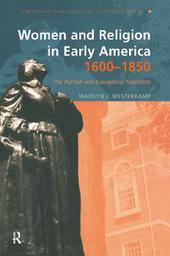
|
Women and Religion in America, 1600-1850
Paperback
Main Details
Description
This text explores the first two centuries of America's religious history, examining the relationship between the socio-political environment, gender, politics and religion. Drawing its background from women's religious roles and experiences in England during the Reformation, the book follows them through colonial settlement, the rise of evangelicalism with the "great awakening", the American Revolution and the second flowering of popular religion in the first half of the 19th century. It traces the female spiritual tradition through the Puritans, Baptists and Shakers, arguing that it was a strong empowering force for women.
Reviews"a fine synopsis of the early years of Protestantism in North America."-"The Historian "Marilyn Westerkamp has written an informative and intelligent overview of women's religious experiences within the Puritan and evangelical traditions in early America...In elucidating the complex and shifting character of women's religious experience, Westerkamp gives an unexpected meaning to the idea of declension in early American religious history. "Journal of the Early Republic. Vol, 21, No. 4. .""By examining the seventeenth-century witchcraft trials and preaching women's endorsement of "traditional" female roles, she demonstrates how religion afforded opportunities for women's empowerment, while also placing limits on that power. Although specialists in women and religion will find much of this book familoiar, and Westerkamps' vauge definition of evangelicalism confuse the relationship among Purtanism, Quakeism, and Methodism, this book provides a helpful introduction to the study of women and religion."-Linda S. Neal, University of North Carolina, Chapel Hill "Much needed synthesis . . . written with grace and clarity. Westerkamp leads the reader through important transformations that have marked American women's place in the radical Protestant tradition."-Susan Juster, University of Michigan "Westerkamp weaves a skillful synthesis of both the constraints on and the opportunities for women in the colonial manifestations of English dissenting traditions.."-The Journal of American History, September 2001
|